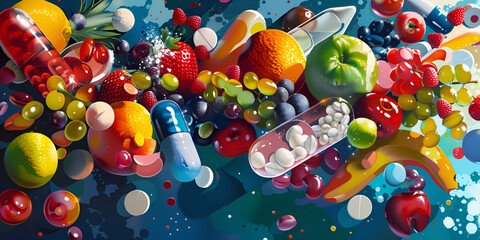Micronutrients
Which micronutrient is important for oxygen transport?

Oxygen transport is a critical physiological process that enables the distribution of oxygen from the lungs to tissues throughout the body, a function vital for sustaining life and enabling cellular respiration. Several micronutrients play essential roles in facilitating this process, particularly through their involvement in the formation and function of red blood cells (RBCs) and haemoglobin, the oxygen-carrying protein. The key micronutrients crucial for oxygen transport include iron, vitamin B12, folate, vitamin C, copper, and vitamin A.

Iron
Role in Oxygen Transport:
Iron is a central component of haemoglobin, the protein in red blood cells that binds to oxygen in the lungs and releases it in tissues. Each haemoglobin molecule contains four iron atoms, which are necessary for its oxygen-carrying capacity.
Sources:
Heme iron: is found in animal products such as red meat, poultry, and fish.
Plant-based foods such as beans, lentils, spinach, and fortified cereals contain non-heme iron.
Deficiency Impact:
Iron deficiency can lead to anaemia, characterized by reduced haemoglobin levels and a decreased ability to transport oxygen, causing symptoms such as fatigue, weakness, and shortness of breath.

Vitamin B12
Role in Oxygen Transport:
Red blood cell maturation and synthesis in the bone marrow depend on vitamin B12. It also plays a role in the synthesis of DNA, which is essential for the proliferation of RBCs.
Sources:
Animal products: Meat, fish, poultry, eggs, and dairy products.
Fortified foods: Some plant-based milk and cereals.
Deficiency Impact:
A deficiency in vitamin B12 can result in megaloblastic anaemia, where RBCs are larger than normal and not fully developed, leading to impaired oxygen transport and symptoms such as fatigue and weakness.

Folate (Vitamin B9)
Role in Oxygen Transport:
Folate works closely with vitamin B12 in the production and maturation of red blood cells. It is essential for DNA synthesis and repair, which is crucial for RBC formation.
Sources:
Leafy green vegetables: Spinach, kale, and broccoli.
Legumes: Beans and lentils.
Fortified foods: Bread, cereals, and pasta.
Deficiency Impact:
Folate deficiency can also lead to megaloblastic anaemia, similar to vitamin B12 deficiency, causing reduced oxygen-carrying capacity of the blood and associated symptoms.

Vitamin C
Role in Oxygen Transport:
Vitamin C enhances the absorption of non-heme iron from plant-based foods and plays a role in maintaining the integrity of blood vessels, which is important for optimal circulation.
Sources:
Fruits: Citrus fruits, strawberries, kiwi, and guava.
Vegetables: Bell peppers, tomatoes, and broccoli.
Deficiency Impact:
Inadequate vitamin C intake can impair iron absorption, potentially leading to iron deficiency anemia and reduced efficiency of oxygen transport.

Copper
Role in Oxygen Transport:
Copper is involved in the formation of haemoglobin and the absorption and utilization of iron. It also plays a role in maintaining the health of blood vessels and the overall circulatory system.
Sources:
Shellfish: oysters and crabs.
Whole grains: quinoa and barley.
Deficiency Impact:
Copper deficiency can result in anaemia and a decreased ability of the body to utilize iron effectively, thereby impairing oxygen transport.

Vitamin A
Role in Oxygen Transport:
Vitamin A is crucial for the differentiation and functioning of RBCs. It also supports the immune system and helps in the production of retinoic acid, which is involved in the regulation of genes related to RBC formation.
Sources:
Animal products: Liver, fish, and dairy products.
Plant sources: Carrots, sweet potatoes, and spinach (as beta-carotene, which the body converts to vitamin A).
Deficiency Impact:
Vitamin A deficiency can lead to impaired RBC production and function, compromising the oxygen-carrying capacity of the blood.
Conclusion
Proper oxygen transport is a complex process that relies on the adequate intake and balance of several micronutrients. Iron, vitamin B12, folate, vitamin C, copper, and vitamin A are particularly critical, each playing a unique role in the formation, function, and maintenance of red blood cells and hemoglobin. Ensuring a diet rich in these essential nutrients is crucial for optimal oxygen transport and overall health.
